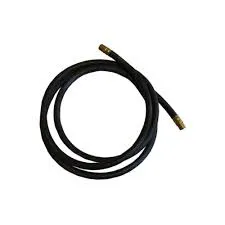Why Does an LPG Hose Pipe Expire After 6 to 24 Months?
Using an LPG Hose Pipe is essential for connecting your LPG cylinder to your gas stove. However, it's crucial to understand why these hose pipes come with an expiration date, typically ranging from 6 to 24 months. Here are the key reasons behind this lifespan:
1. Material Degradation
LPG Hose Pipes are made from rubber or other flexible materials that degrade over time. Constant exposure to LPG, which is a hydrocarbon, can cause the rubber to lose its elasticity, leading to cracks and leaks. These leaks can pose significant safety risks, including fire hazards.
2. Wear and Tear
Daily use of an LPG Hose Pipe subjects it to wear and tear. Bending, twisting, and other physical stresses can weaken the structure of the hose pipe, making it prone to damage. Over time, even minor damages can compromise the integrity of the hose, necessitating replacement.

3. Exposure to Elements
LPG Hose Pipes are often exposed to various environmental elements such as heat, moisture, and sunlight. These elements can accelerate the aging process of the hose. UV rays from the sun can particularly cause the rubber to become brittle and crack.
4. Chemical Reactions
LPG contains chemicals that can react with the materials used in the hose pipe. These chemical reactions can deteriorate the inner lining of the hose, leading to potential gas leaks. Regular replacement ensures that the hose maintains its structural integrity and safety standards.
5. Manufacturer's Safety Standards
Manufacturers specify expiration dates for LPG Hose Pipes based on rigorous testing and safety standards. These guidelines are put in place to prevent accidents and ensure user safety. Adhering to the manufacturer's recommendations helps in maintaining a safe and efficient gas connection system.
Safety Tips for Using LPG Hose Pipes
- Regular Inspection: Frequently check your LPG Hose Pipe for any signs of wear, cracks, or leaks. Replace the hose immediately if any damage is detected.
- Proper Installation: Ensure that the hose is properly installed and secured with clamps to prevent it from detaching.
- Avoid Exposure: Keep the hose away from direct sunlight, heat sources, and sharp objects to prolong its lifespan.
- Follow Manufacturer Guidelines: Always follow the manufacturer's recommendations for the usage and replacement of the LPG Hose Pipe.
In conclusion, regularly replacing your LPG Hose Pipe within the recommended time frame of 6 to 24 months is crucial for ensuring the safety and efficiency of your gas connection. By understanding the reasons behind the expiration, you can take proactive steps to maintain a safe home environment.




